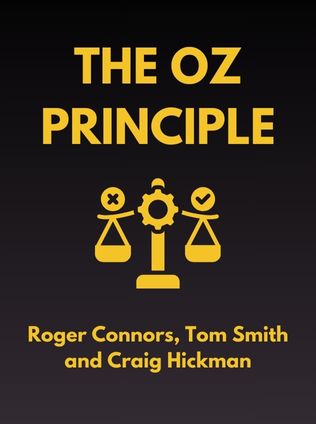
The Oz Principle
Getting Results Through Individual and Organizational Accountability
By Roger Connors, Tom Smith, and Craig Hickman
Published 01/1994
About the Author
Roger Connors and Tom Smith are influential thought leaders in the field of organizational development and leadership. They co-founded Partners In Leadership, a global consulting firm that has worked with countless organizations to instill a culture of accountability and high performance. Both authors are dedicated to helping businesses and individuals achieve their fullest potential by fostering a deep understanding of accountability. Through their numerous books, including "The Oz Principle," they have revolutionized the way leaders and employees approach challenges, encouraging a shift from a victim mentality to one of ownership and proactive problem-solving. Their work has been recognized and implemented by major corporations worldwide, making a lasting impact on organizational culture and success.
Main Idea
The crux of "The Oz Principle" is the idea that accountability is the key to personal and organizational success. The authors use the timeless allegory of "The Wizard of Oz" to demonstrate the journey from victimhood to accountability. In the story, Dorothy and her companions seek external solutions from the Wizard, only to discover that they had the power to achieve their desires within themselves all along. Similarly, "The Oz Principle" teaches that true empowerment comes from within, through the recognition and acceptance of personal responsibility. By moving away from a victim mentality and embracing accountability, individuals and organizations can overcome obstacles, achieve their goals, and realize their full potential.
Table of Contents
- Understanding the Victim Mentality
- Facing the Facts
- Admitting Your Role
- Taking Responsibility for Solving Problems
- Taking Action
- Building a Culture of Accountability
- Conclusion: The Power of Accountability
Understanding the Victim Mentality
At the heart of "The Oz Principle" is the notion that the victim mentality is a major barrier to success. This mentality is characterized by a belief that one's circumstances are controlled by external forces, leading to feelings of helplessness and powerlessness. When individuals or organizations adopt a victim mindset, they are quick to blame others, make excuses, and resist taking responsibility for their actions or outcomes.
The authors describe the victim mentality as a form of self-sabotage. It is a comforting but ultimately destructive mindset that prevents growth and progress. By staying in this state, individuals avoid the discomfort of confronting their own shortcomings or the reality of their situations. However, this avoidance comes at the cost of personal and professional development.
For example, an employee who consistently blames their lack of advancement on external factors—such as a difficult boss or a challenging work environment—may find temporary solace in these excuses. Yet, by not addressing the areas where they could improve, such as their work performance or communication skills, they miss out on opportunities for growth and promotion.
"The victim mentality encompasses a variety of behaviors and thought patterns that keep you trapped, disempowered, and unable to realize your potential." – Roger Connors and Tom Smith
The Common Traps of the Victim Mentality
- Blame: Shifting responsibility to others for failures or challenges.
- Excuses: Rationalizing poor performance or lack of progress.
- Inaction: Waiting for others to solve problems instead of taking initiative.
- Defensiveness: Rejecting feedback or opportunities for improvement.
- Negativity: Focusing on problems without seeking solutions.
The victim mentality is pervasive because it allows individuals to avoid the discomfort of self-examination. However, this mindset is ultimately self-limiting. The authors argue that recognizing these behaviors is the first step toward breaking free from the victim mentality and moving toward a mindset of accountability.
Facing the Facts
The journey from victimhood to accountability begins with a willingness to face the facts. This step is crucial because accountability requires a clear understanding of reality. According to the authors, facing the facts involves confronting uncomfortable truths about one's situation, acknowledging external changes, and recognizing one's own role in creating or perpetuating problems.
Sign up for FREE and get access to 1,400+ books summaries.
You May Also Like
The Subtle Art of Not Giving a F*ck
A Counterintuitive Approach to Living a Good Life
By Mark MansonRich Dad Poor Dad
What the Rich Teach Their Kids About Money - That the Poor and Middle Class Do Not!
By Robert T. KiyosakiHow To Win Friends and Influence People
The All-Time Classic Manual Of People Skills
By Dale CarnegieQuiet: The Power of Introverts
The Power of Introverts in a World That Can't Stop Talking
By Susan Cain



















